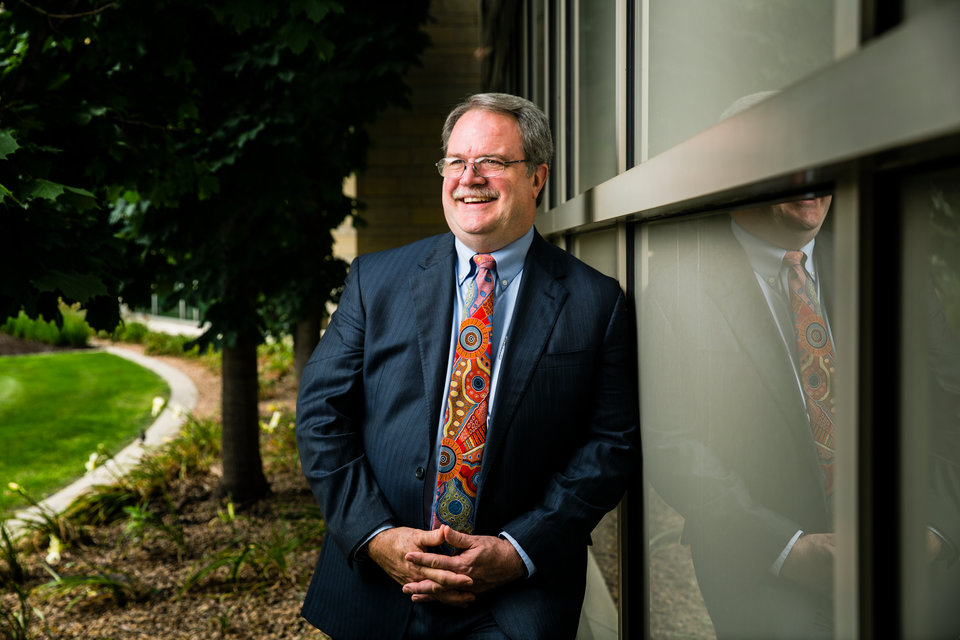"I guess, I am just a curious guy who wants to help people."
This statement by Professor Jerry Organ is an apt description of himself. His curiosity has led him into different areas of research, involving both traditional scholarly writing and databased projects. Throughout all this has been his desire to help others, particularly law students, determine their best paths.
Exploring Data Related to Legal Education
Beginning in 2009, Organ became interested in two aspects of a law school’s “investment” decisions – scholarship programs, and employment and salary statistics.
“I was curious how many law schools are like ours – giving scholarships that automatically renew each year,” Organ said. So, he decided to research conditional scholarship programs and found that schools were not required to record that data. He wrote an article exposing the lack of transparency among law schools in 2011 and, subsequently, The New York Times tapped him to contribute to an article.
That research culminated in an appointment to an American Bar Association committee. “Partly because of what I wrote mandating disclosure, the ABA required more consistent reporting with respect to conditional scholarship.” Organ said. “There are now 40 fewer law schools with conditional scholarship programs.” At the same time, the ABA also began requiring law schools to report employment outcomes in a more detailed manner. As a result, law schools also are more focused on helping their students pass the bar and find meaningful employment.
Organ’s most recent pondering concerned whether law school was equally expensive for all law students. He analyzed trends in average “net tuition” across LSAT categories to identify the extent to which law students in different LSAT categories experience different average “net tuition.” His research, supported by a grant from Access Group (now AccessLex Institute), looks at average “net tuition” – tuition after scholarships – for first-year students from 2010-2014, and shows that for many students in the middle of the LSAT distribution, law school actually has become less expensive during that period.
The goal is to better understand how the decreasing numbers and changing demographics of law students are impacting law schools and law students in relation to how scholarships are awarded. This analysis also compares short-term return on investment by looking at how bar passage outcomes and employment outcomes differ for graduates of law schools based on median LSAT of the law schools. The Journal of Legal Education will publish the results this fall.
Fostering Professional Identity Formation
As part of Organ’s focus on helping law students succeed at St. Thomas, he has been teaching Foundations of Justice for several years along with teaching in the Mentor Externship Program. He has teamed up with St. Thomas Law Professor Neil Hamilton to host summer workshops for teams of faculty and staff from law schools around the world to help them strengthen their students’ professional identity formation. As co-directors of the Holloran Center for Ethical Leadership in the Professions, the two have led workshops and organized symposia relating to professional identity formation.
Through these sessions, Organ and Hamilton are helping educators learn how to help law students be successful. Ultimately, “when you look at what sets students apart, the learning outcomes need to focus on self-understanding and self-directedness coupled with professional communication,” Organ said.
Over five summers, the workshops have attracted nearly 200 participants from more than 35 law schools, including institutions in India, Mexico and Brazil.
Last May, the Holloran Center held a gathering of Law Schools with First-Year Courses/Programs Focused on Professional Identity Formation and welcomed representatives from 19 schools along with representative teams from 20 other law schools interested in developing such a program. The idea of encouraging students to pursue meaningful employment is impacting all law schools, including law schools such as Columbia University and the University of Chicago, both of which were represented at the May gathering.
“Those schools have plenty of jobs, but they want to help their graduates find meaningful employment,” Organ said. This is a shift in law school education; the focus is uniquely tied tohow the law student specifically defines his or her own success.
Organ mentioned that “the job may not be what will sustain your spirit.” Law school educators, through attending workshops, are taking note and working to help law students pursue meaningful vocations.
Organ also has written several pieces about professional formation. He was one of the principal investigators on the Survey of Law Student Well Being, the first multi-school study focused on mental health, and alcohol and drug use among law students, which was published in the Journal of Legal Education.
Organ said he feels blessed to be working at St. Thomas Law: “I have great colleagues who are committed to a shared mission and vision of a holistic approach to legal education, and I get to work with wonderful students who are exploring who they want to be as lawyers.”
His curiosity pushes him to continue his research, and his desire to help others motivates him in the classroom and in his efforts to publish articles, coordinate symposia and teach workshops. It is the perfect mix for a self-proclaimed “curious guy who wants to help people.”
